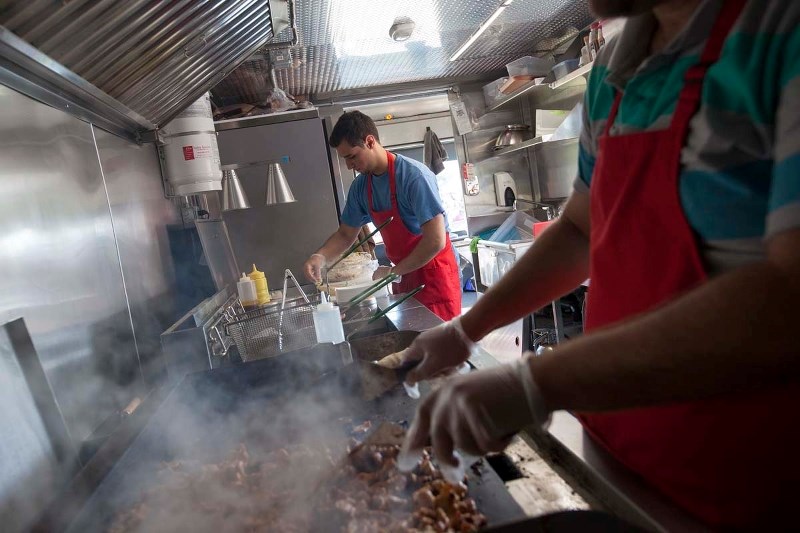On a busy weekend, Dedo's Food Truck can fill the bellies of 300 people.
That equates to about 200 pitas, 40 kilograms of chicken and 20 kilograms of beef.
With two large events on one weekend – Rock'n August and the St. Albert Farmers' Market two weeks ago – things can get quite hectic in a 16 by 8 feet restaurant on wheels.
"It was like a sauna in here last week," says A.J. Abu Jaib, who works on the food truck owned by sister Ranya and her husband Tarek Selek.
Temperature control – keeping hot foods hot, cold foods cold – cross-contamination and employee hygiene are some food safety handling practices that become more challenging for mobile eateries compared to brick-and-mortar restaurants, says Dr. Chris Sikora, Alberta Health Services Medical Officer of Health.
Last year, the Calgary Sun reported that 26 of 35 food trucks in Calgary were written up for critical health violations, the majority due to water and temperature issues.
"Having a mobile restaurant is … more challenging from a food safety perspective because of the openness to the outdoors and the small, mobile nature," says Sikora.
Fixed restaurants are inspected at least three times per year. Food trucks are checked when they first obtain their permit, for certain special events and when there is a publicly-demanded inspection.
Food trucks are held to the same health standards as restaurants, says Sikora, but inspections are less frequent due to their short business season.
Unlike Calgary, health inspection reports for Edmonton area mobile eateries are not posted online. The goal is to have them on the web eventually, says Sikora, as AHS is currently working on a singular IT infrastructure.
In the meantime, inspection reports can only be obtained by filing a freedom of information request through Alberta Health.
Safe street eats
The notion that street food is unsafe is a myth, says a study released in June by the Institute for Justice, a civil liberties law firm in Virginia.
An analysis of 260,000 food safety inspection reports from mobile eateries in seven large American cities found that in six out of seven cities, trucks and carts averaged fewer sanitation violations than restaurants.
The study suggests regular inspections keep mobile eateries held to the same standards as restaurants.
But regular inspections of food trucks are difficult because of their "elusive" nature, states a recently published paper in the Journal of Environmental Health.
California researchers found that 90 of the 95 food trucks surveyed had at least one critical food safety risk factor (85 per cent of trucks exhibited improper or no hand washing).
Due to their mobile nature, trucks can be difficult to locate for regularly scheduled inspection, state authors, and when inspections are done, it's not during hours of eatery operation.
Clean kitchen, more customers
When Selek decided to enter the food truck business with Dedo's, cleanliness and quality were his top priorities.
He had the truck specially outfitted with two industrial sized fridges for proper food storage (one side meat, one side veggies and a separate cooler for beverages) and separate sinks for dishwashing and hand washing.
The majority of the kitchen is covered in stainless steel – for easy cleaning – with extra covers that can be pulled over the stove and sink for food preparation.
Specific containers, cutting boards and utensils also eliminate cross-contamination.
Having run a professional kitchen before, food trucks have to be more transparent with their customers because of their open kitchen, says Selek.
"Restaurants don't have to be clean because no one sees the back," he says. "People like to see how we make it and they like to see us work clean."




